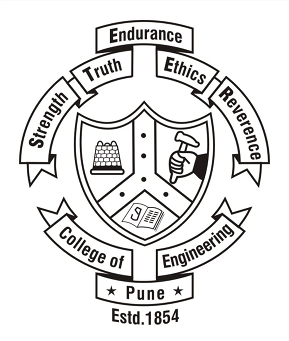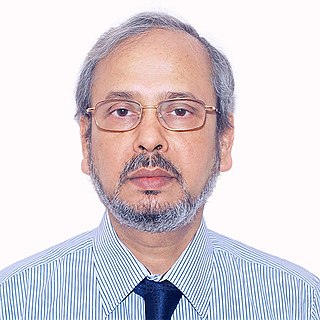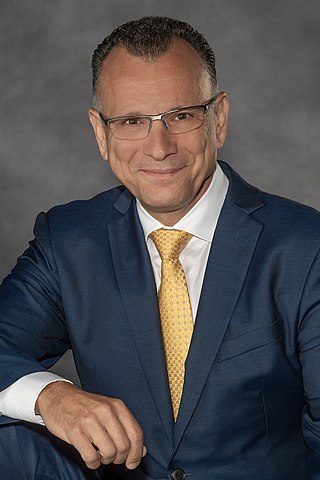
Computational fluid dynamics (CFD) is a branch of fluid mechanics that uses numerical analysis and data structures to analyze and solve problems that involve fluid flows. Computers are used to perform the calculations required to simulate the free-stream flow of the fluid, and the interaction of the fluid with surfaces defined by boundary conditions. With high-speed supercomputers, better solutions can be achieved, and are often required to solve the largest and most complex problems. Ongoing research yields software that improves the accuracy and speed of complex simulation scenarios such as transonic or turbulent flows. Initial validation of such software is typically performed using experimental apparatus such as wind tunnels. In addition, previously performed analytical or empirical analysis of a particular problem can be used for comparison. A final validation is often performed using full-scale testing, such as flight tests.

College Of Engineering Pune (COEP) Technological University is a unitary public university of the Government of Maharashtra, situated in Pune, Maharashtra, India. Established in 1854, it is the 3rd oldest engineering institute in India, after College of Engineering, Guindy (1794) and IIT Roorkee (1847). The students and alumni are colloquially referred to as COEPians. On 23 June 2022, Government of Maharashtra issued a notification regarding conversion of the college into a independent technological university. On 24 March 2022, both the houses of the state government passed the CoEP Technological University bill, which has conferred a unitary state university status on the institute.
A CFD-DEM model is suitable for the modeling or simulation of fluid-solids or fluid-particles systems. In a typical CFD-DEM model, the phase motion of discrete solids or particles is obtained by the Discrete Element Method (DEM) which applies Newton's laws of motion to every particle and the flow of continuum fluid is described by the local averaged Navier–Stokes equations that can be solved by the traditional Computational Fluid Dynamics (CFD). The model is first proposed by Tsuji et al. The interactions between the fluid phase and solids phase is better modeled according to Newton's third law.
Gretar Tryggvason is Department Head of Mechanical Engineering and Charles A. Miller Jr. Distinguished Professor at Johns Hopkins University. He is known for developing the front tracking method to simulate multiphase flows and free surface flows. Tryggvason was the editor-in-chief of Journal of Computational Physics from 2002–2015.

Dudley Brian Spalding, FRS FREng was Professor of Heat Transfer and Head of the Computational Fluid Dynamics Unit at Imperial College, London. He was one of the founders of computational fluid dynamics (CFD) and an internationally recognized contributor to the fields of heat transfer, fluid mechanics and combustion. He created the practice of CFD – its application to problems of interest to engineers. Most of today’s commercially available CFD software tools trace their origin to the work done by Spalding's group in the decade spanning the mid-60s and mid-70s. Spalding became a Fellow of the Royal Society and Fellow of the Royal Academy of Engineering.
In computational fluid dynamics (CFD), the SIMPLE algorithm is a widely used numerical procedure to solve the Navier–Stokes equations. SIMPLE is an acronym for Semi-Implicit Method for Pressure Linked Equations.
Dale A. Anderson is an American aerospace engineer, computational fluid dynamicist, researcher, author and professor. He pioneered research in computational fluid dynamics (CFD) with his work at Iowa State University (ISU), alongside John C. Tannehill and Richard H. Pletcher. Anderson was the Professor of Aerospace Engineering, Vice President for Research, and Dean of Graduate Studies at the University of Texas at Arlington, United States. He is best known for his overall contributions to the field of computational fluid dynamics (CFD).
Mohammed Yousuff Hussaini is an Indian born American applied mathematician. He is the Sir James Lighthill Professor of Mathematics and Computational Science & Engineering at the Florida State University, United States. Hussaini is also the holder of the TMC Eminent Scholar Chair in High Performance Computing at FSU. He is widely known for his research in scientific computation, particularly in the field of computational fluid dynamics (CFD) and Control and optimization. Hussaini co-authored the popular book Spectral Methods in Fluid Dynamics with Claudio Canuto, Alfio Quarteroni, and Thomas Zang. He is the editor-in-chief of the journal Theoretical and Computational Fluid Dynamics.
Brian Edward Launder, FRS, FREng is a Professor of Mechanical Engineering at the University of Manchester, United Kingdom. He is known for his work in the field of turbulent flows in general and turbulence modelling in particular. In 1994, he became a Fellow of the Royal Society.
The power law scheme was first used by Suhas Patankar (1980). It helps in achieving approximate solutions in computational fluid dynamics (CFD) and it is used for giving a more accurate approximation to the one-dimensional exact solution when compared to other schemes in computational fluid dynamics (CFD). This scheme is based on the analytical solution of the convection diffusion equation. This scheme is also very effective in removing False diffusion error.
False diffusion is a type of error observed when the upwind scheme is used to approximate the convection term in convection–diffusion equations. The more accurate central difference scheme can be used for the convection term, but for grids with cell Peclet number more than 2, the central difference scheme is unstable and the simpler upwind scheme is often used. The resulting error from the upwind differencing scheme has a diffusion-like appearance in two- or three-dimensional co-ordinate systems and is referred as "false diffusion". False-diffusion errors in numerical solutions of convection-diffusion problems, in two- and three-dimensions, arise from the numerical approximations of the convection term in the conservation equations. Over the past 20 years many numerical techniques have been developed to solve convection-diffusion equations and none are problem-free, but false diffusion is one of the most serious problems and a major topic of controversy and confusion among numerical analysts.
Computational fluid dynamics (CFD) are used to understand complex thermal flow regimes in power plants. The thermal power plant may be divided into different subsectors and the CFD analysis applied to critical equipment/components - mainly different types of heat exchangers - which are of crucial significance for efficient and trouble free long-term operation of the plant.
Professor Yogesh Jaluria is Board of Governors Professor and Distinguished Professor at Rutgers, the State University of New Jersey, in the Department of Mechanical and Aerospace Engineering. He is a specialist in thermal sciences and engineering.

Gautam Biswas is presently a professor of mechanical engineering at the Indian Institute of Technology (IIT) Kanpur. Earlier, he has been the director of Indian Institute of Technology Guwahati, and director of the CSIR - Central Mechanical Engineering Research Institute at Durgapur. As a faculty member of IIT Kanpur, he has served the Institute in various capacities including the Dean of Academic Affairs. Prof Gautam Biswas is a Fellow of the three science academies, such as, the Indian National Science Academy, the Indian Academy of Sciences and the National Academy of Sciences India. He is a Fellow of the Indian National Academy of Engineering (INAE) and Institution of Engineers (IEI). He was the occupant of the position of GD and VM Mehta Endowed Chair Professor of Mechanical Engineering at the Indian Institute of Technology Kanpur. A Fellow of the American Society of Mechanical Engineers (ASME), Prof Biswas is the author of more than 150 scientific publications and guided 23 PhD theses. In the year 2011, he was awarded the esteemed J C Bose National Fellowship by the Science and Engineering Research Board (DST), Government of India. Biswas completed his B.E. from IIEST(Erstwhile B.E. College under Calcutta University) in 1979. He completed his PhD from the Indian Institute of Technology Kharagpur in 1985. He was an Alexander von Humboldt Fellow at the Ruhr University Bochum in Germany and JSPS Invitation Fellow at the Yokohama National University, Japan. He has been a guest professor at the Friedrich-Alexander-Universität Erlangen-Nürnberg, Germany. Prof. Biswas was awarded an honorary doctorate by the National Institute of Technology Agartala in 2017. He has been conferred honorary doctorate by the Aristotle University of Thessaloniki, Greece, in 2018. In recognition of his stellar contribution in the fields of Fluid Mechanics and Thermal Sciences, his contributions as an academic administrator and his dedicated service to the institute, IIT Kanpur bestowed upon Professor Gautam Biswas the award of Institute Fellow for the year 2020. In recognition of his outstanding contribution to teaching, IIT Kanpur conferred the Distinguished Teacher Award upon Professor Gautam Biswas in the year 2022. Prof. Biswas has been selected for 2023 ASME Heat Transfer Memorial Award in the Science Category for Sustained and Outstanding Contributions to Thermal Science and Engineering, including Heat Transfer Enhancement, Phase Change Heat Transfer with and without Electrohydrodynamic Forces and Dynamics of Liquid Jet and Droplet Impingement.
Vivek Vinayak Ranade is an Indian chemical engineer, entrepreneur and a professor of chemical engineering at the School of Chemistry and Chemical Engineering of the Queen's University, Belfast. He is a former chair professor and deputy director of the National Chemical Laboratory, Pune. He is known for his work on bubble column, stirred and trickle-bed reactors and is an elected fellow of the Indian Academy of Sciences, Indian National Science Academy. and the Indian National Academy of Engineering. The Council of Scientific and Industrial Research, the apex agency of the Government of India for scientific research, awarded him the Shanti Swarup Bhatnagar Prize for Science and Technology, one of the highest Indian science awards for his contributions to Engineering Sciences in 2004.
Mujeeb R. Malik is a Pakistani born American aerospace engineer serving as Senior Aerodynamicist at NASA Langley Research Center. He is known for his research in boundary layer stability, laminar-turbulent transition, computational methods and aerodynamic simulations. He was the architect of CFD Vision 2030, a NASA-sponsored study to advance the state-of-the-art of computational fluid dynamics (CFD) by exploiting high performance computing and modern validation experiments.
Amit Agrawal is an Indian engineer and an institute chair professor at the department of mechanical engineering of the Indian Institute of Technology, Bombay. He leads a group of scientists who are involved in the development of next-generation diagnostic microdevices.

Fotis Sotiropoulos is a Greek-born American engineering professor and university administrator known for his research contributions in computational fluid dynamics for river hydrodynamics, renewable energy, biomedical and biological applications. He currently serves as the Provost and Senior Vice President for Academic Affairs of Virginia Commonwealth University, a position he has held since August 1, 2021

Simcenter STAR-CCM+ is a commercial Computational Fluid Dynamics (CFD) based simulation software developed by Siemens Digital Industries Software. Simcenter STAR-CCM+ allows the modeling and analysis of a range of engineering problems involving fluid flow, heat transfer, stress, particulate flow, electromagnetics and related phenomena.

Jayathi Y. Murthy is an Indian-American mechanical engineer who is the current President of Oregon State University. Previously, she was the Ronald and Valerie Sugar Dean of the UCLA Henry Samueli School of Engineering and Applied Science at the University of California, Los Angeles where she was also a distinguished professor. Her research interests include macroelectronics, computational fluid dynamics, heat transfer, and phase-change materials. Murthy has served on the Engineering and Computer Science jury for the Infosys Prize since 2018.






